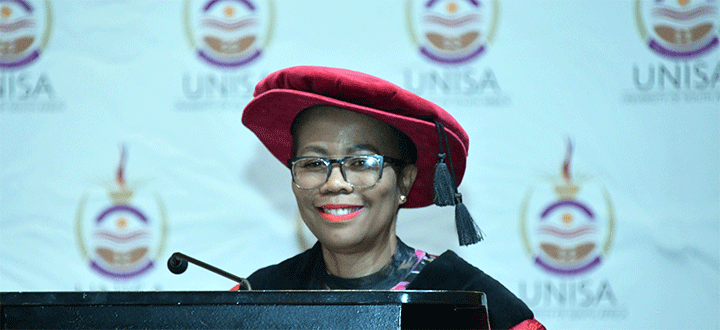Innovation, Technology Transfer and Commercialisation
Unlocking Unisa's innovative ideas
Unisa, as an entrepreneurial university, launched the Directorate of Innovation, Technology Transfer and Commercialisation's (DITTC) Pre-Incubation Programme in 2020. The programme was born from a need to support the innovative ideas emerging from the university and guide these to deliver a minimum viable product.

Basanda Pongoma, Pre-Incubation Programme Leader and Business Development Specialist, DITTC
The pre-incubation programme supports students and staff to further nurture the spirit of entrepreneurship within Unisa and support the DITTC's vision to lead the effective and efficient transfer of Unisa technologies for humanity's benefit.
The programme was established with eight startups who had previously won a Unisa Innovation Challenge. Since its inception, the programme has enjoyed tremendous success. As of 2022, it recorded a cohort of 20 members from various, sectors including Edtech, Agritech, mobility, food, security and sanitation – among others.
The programme is open to registered Unisa students and Unisa staff. In addition, various feeder programmes have been identified, and intakes are garnered from the Unisa Innovation Challenge and Tshwane Inter-University Innovation Challenge winners, as well as the BlueOceans Corners and the Innovation Support Programme recipients.
The Pre-Incubation Programme's growth has seen the development of offerings to cohorts. A structured three-month curriculum is delivered that equips cohort members with the necessary tools required to take their startup and ideas from conception to market. In addition, mentorship is a vital offering of the programme. Internal mentorship is offered through monthly meetings led by the Programme Leader, Basanda Pongoma, a Business Development Specialist at DITTC.
A recently launched innovation club also stimulates conversation between startups in the programme and encourages them to be a support system to fellow startups – sharing knowledge and gaining insights. Expert sessions are delivered by industry experts who provide valuable guidance regarding legislative requirements, growing business models, preparing plans, engaging the target market, and more. One-on-one mentorship is also offered as a third prong in mentoring the cohorts. The individual mentorship offers focused support that guides the member's unique needs and ensures that they understand their sector and insights into the market.
Participants in the programme are placed with well-aligned incubation hubs that can support the development of their prototypes. Moreover, these hubs are available across South Africa and the African continent as a whole. As such, the programme provides a pipeline to feed the Unisa incubator and external incubators – facilitating a symbiotic partnership for developing entrepreneurial spirit with South Africa.
Since its inception, the programme has been well received and has noted many proud accomplishments. Startups from this programme are beginning to make inroads into various external programmes, including some internationally. For example, three of the six Unisa startups will soon represent South Africa in the Blue Oceans International competition scheduled for December 2022. In addition, some startups have been selected to participate in programmes in Sweden, the UK, Rwanda, Germany, and Brazil. This creates exposure for these startups and visibility for Unisa as an entrepreneurial university supporting innovation and entrepreneurship. Furthermore, all startups linked to this programme can generate prototypes and test them, enabled via the partnerships that Unisa has established with incubators and maker's spaces countrywide. A few startups have also participated in a cross-border mentorship programme that the University of Campinas manages through its Global Partners Programme, of which the DITTC is a part.
Unisa believes the pre-seed startup programme can achieve its vision of transferring technological knowledge and skill, promoting innovation, and enhancing ties between universities, research institutions, and business communities.
Having enjoyed tremendous success over the past two years, Unisa is confident that the programme will continue to develop and that it can positively contribute towards the entrepreneurial growth of the country so that the economy may be stimulated. In addition, the job market will benefit from the advancements made.
*By Yoko Bewick, Directorate of Innovation, Technology Transfer and Commercialisation
Publish date: 2022-11-25 00:00:00.0


 President Ramaphosa appoints Unisan to the CRL Rights Commission
President Ramaphosa appoints Unisan to the CRL Rights Commission
 Unisa VC appointed for second term, looks back on the 2024 academic year
Unisa VC appointed for second term, looks back on the 2024 academic year
 From passion to profession: Sonto Mthwane's journey in tourism management
From passion to profession: Sonto Mthwane's journey in tourism management
 Uniting for open knowledge
Uniting for open knowledge
 Unisa to partner with Government to tackle water, energy and infrastructure challenges
Unisa to partner with Government to tackle water, energy and infrastructure challenges